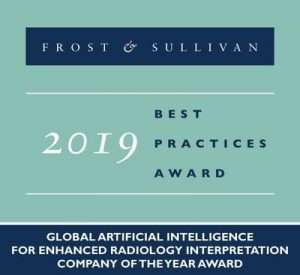
Based on its recent analysis of the global market for Artificial Intelligence (AI) for enhanced radiology interpretation market, Frost & Sullivan recognizes Philips with the 2019 Global Company of the Year Award. Philips’ paradigm of combining physician enhancing, AI-based technologies, driven by contextual insights, and embedded into radiology workflows, is a disruptive imaging informatics strategy. It underscores the company’s approach of employing clinically intelligent software to adapt to radiologists’ skills and preferences. The company embeds advanced algorithms across multiple touchpoints in the radiologist workflow and patient care pathway, offering insights each step of the way. This new paradigm generates dynamic, meaningful, insight-rich findings delivered in a tailored, context-aware view, empowering radiologists to transition from volume- to value-based care.
“Philips provides integrated solutions and services spanning the health continuum, care levels, and settings. Its vision centers on sustainable health with the stated purpose of improving the lives of 3 billion people a year by 2030,” said Siddharth Shah, Industry Manager. “To this end, the company views AI not as a point solution enabler, but as an embedded facilitator in the entire radiology workflow, delivering an enhanced, seamless experience to the radiologist. Philips has optimally harnessed its technology assets across various industries and business units with the end-goal of facilitating holistic, patient-specific insights and smart clinical decision-making at the point-of-care.”
Philips seeks to empower care teams to offer precision medicine (PM) by adopting a systems approach to patient care. Its Enterprise Diagnostic Imaging Solution is a configurable suite of informatics tools granting care teams access to vital information, and then leveraging that information to cultivate the insights needed for precision diagnosis. It combines clinical domain and operational knowledge to channel their components into solutions that propel its clinical and diagnostic service lines. The company now owns one of the industry’s broadest portfolios, fueled by deep research collaborations with clinical partners and outreach for enhancing third-party informatics solutions.
Philips’ AI paradigm stands out from competing approaches in three ways – contextual relevance, reduced variability, and extensibility. The system streamlines workflows and enables intuitive, robust, and reliable hanging protocols backed by an intelligent image processing engine. The company is now working toward integrating AI algorithms in its precision diagnostics platform and imaging modalities, whether developed internally, through deep customer partnerships, or integrated via third-party collaborations directly within radiologist-caregiver workflows.
“Philips is uniquely positioned to reshape the radiology value chain,” noted Shah. “Its brand strength, global medical imaging footprint, and extensive informatics portfolio, coupled with its ability to establish partnerships with third-party AI imaging vendors enable it to offer industry-best, seamless workflows across integrative medical imaging informatics.”
Each year, Frost & Sullivan presents a Company of the Year award to the organization that demonstrates excellence in terms of growth strategy and implementation in its field. The award recognizes a high degree of innovation with products and technologies, and the resulting leadership in terms of customer value and market penetration.
Frost & Sullivan Best Practices awards recognize companies in a variety of regional and global markets for demonstrating outstanding achievement and superior performance in areas such as leadership, technological innovation, customer service, and strategic product development. Industry analysts compare market participants and measure performance through in-depth interviews, analysis, and extensive secondary research to identify best practices in the industry.
